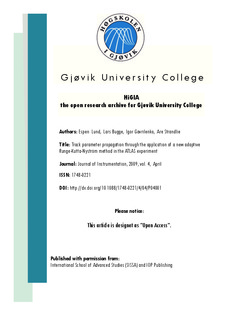| dc.contributor.author | Lund, Espen | |
| dc.contributor.author | Bugge, Lars | |
| dc.contributor.author | Gavrilenko, Igor | |
| dc.contributor.author | Strandlie, Are | |
| dc.date.accessioned | 2009-01-01T00:00:01Z | |
| dc.date.issued | 2009 | |
| dc.identifier.citation | Journal of Instrumentation, 2009, vol.4, April | en |
| dc.identifier.issn | 1748-0221 | |
| dc.identifier.uri | http://hdl.handle.net/11250/142585 | |
| dc.description | Originally published in the Journal of Instrumentation: http://www.iop.org/EJ/journal | en |
| dc.description.abstract | In this paper we study several fixed step and adaptive Runge-Kutta methods suitable for transporting track parameters through an inhomogeneous magnetic field. Moreover, we present a new adaptive Runge-Kutta-Nyström method which estimates the local error of the extrapolation without introducing extra stages to the original Runge-Kutta-Nyström method. Furthermore, these methods are compared for propagation accuracy and computing cost efficiency in the simultaneous track and error propagation (STEP) algorithm of the common ATLAS tracking software. The tests show the new adaptive Runge-Kutta-Nyström method to be the most computing cost efficient. | en |
| dc.format.extent | 210771 bytes | |
| dc.format.mimetype | application/pdf | |
| dc.language.iso | eng | en |
| dc.publisher | International School of Advanced Studies (SISSA) and IOP Publishing | en |
| dc.subject | simulation methods and programs | en |
| dc.subject | pattern recognition | en |
| dc.subject | cluster finding | en |
| dc.subject | data processing methods | en |
| dc.title | Track parameter propagation through the application of a new adaptive Runge-Kutta-Nyström method in the ATLAS experiment | en |
| dc.type | Journal article | en |
| dc.type | Peer reviewed | en |
| dc.subject.nsi | VDP::Mathematics and natural science: 400::Physics: 430::Electromagnetism, acoustics, optics: 434 | en |
| dc.source.volume | 4 | en |
| dc.source.journal | Journal of Instrumentation | en |
| dc.identifier.doi | http://dx.doi.org/10.1088/1748-0221/4/04/P04001 | en |
